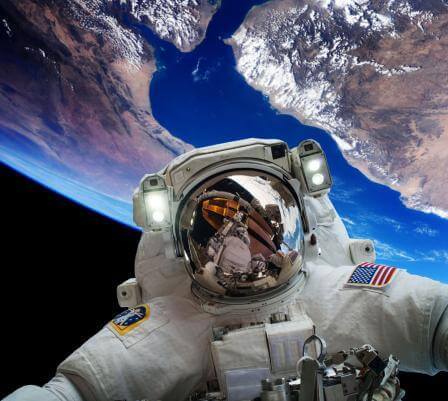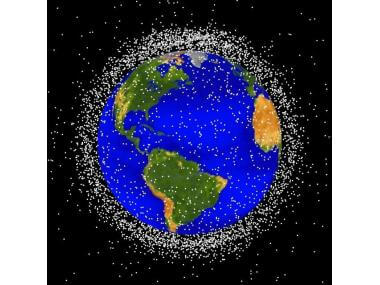David Bowie and the Importance of Space Travel
The theme of space travel was prominent throughout Bowie’s music. In honor of the inspirational musician’s career, let’s explore the connection between science fiction, the pursuit of the unknown, and knowledge of our place in the cosmos, as well as how it inspires future space travel.

Today the world awoke to the sad news of the passing of singer, songwriter, actor, painter, and all-around inspiration, David Bowie. As a woman in a highly technical, male-dominated field, I have always connected with his role as the patron saint for those who are deemed weird or sometimes made to feel that they don’t belong. The man merged the perspectives of science fiction and glam rock, evidence that two genres can always learn from each other, no matter how distant from one another they may lie on the cultural spectrum.
His message of “turn and face the strange” is also a familiar theme for those involved in scientific pursuits, where new results can be favored over traditional lore when current research leads us away from accepted truths. Even more directly, however, the theme of science fiction, specifically space travel, was prominent in Bowie’s work. His appreciation of the cosmos is honored by an asteroid with his name that orbits the Sun peacefully between Mars and Jupiter.
Bowie’s first hit song, the career-making Space Oddity, reveals the loneliness of “Major Tom” who, despite having traveled “past one hundred thousand miles” feels “very still.” The songs release coincided with the humanity’s first steps on solid ground off of our planet Earth when Apollo 11 brought NASA astronauts to the lunar Sea of Tranquility in 1969. Canadian astronaut Chris Hadfield recorded his own version of Space Oddity while aboard the International Space Station sitting in his own “tin can far above the world”. In the video you can watch him float after his guitar in microgravity before playing those famous chords.
Hadfield tweeted today, “Ashes to ashes, dust to stardust. Your brilliance inspired us all. Goodbye Starman.” British astronaut Tim Peake, currently aboard the ISS, also tweeted today to say that he was “saddened to hear David Bowie has lost his battle with cancer—his music was an inspiration to many.”
Bowie’s fifth album, The Rise and Fall of Ziggy Stardust and the Spiders from Mars, released in 1972, tells the story of an alien rock star come to Earth to comfort humanity in its last five years of existence. Ziggy Stardust was ranked the 35th best album of all time by Rolling Stone magazine.
In 1976, Bowie starred in his first film role as an alien who has come to Earth in search of water to take back to his severely drought-ridden planet. In The Man Who Fell to Earth, Bowie’s character must use his knowledge of advanced technology to gain the fortune he needs to build a shuttle for his return trip without letting the Earthly temptations of greed and addiction get in the way. Although clearly not based on a true story, talk of mining other planets or asteroids for materials that are rare on Earth and the pursuit of water elsewhere in our solar system exist well outside the realm of science fiction.
Why Is Space Travel Important?
Bowie’s repeated exploration of our connection to the cosmos as a way of gaining perspective on our own lives reflects, I would argue, a driving reason behind humanity’s pursuit of the exploration of space. Some wonder: why bother with the exploration of distant worlds when we haven’t even fixed the problems on our own planet? NASA has also shifted the task of developing its own vehicles for space exploration into the hands of private companies.
So why is it important to explore our surroundings? Although I believe there are many more, here are my top four reasons for continuing our pursuit of the unknown.
-
Space exploration is hard. Humans are naturally competitive, albeit some more than others, and we like to be challenged. Our nearest planetary neighbor, Mars, is, at its closest, an already unfathomable 36 million miles away. That’s a distance of about 3 lightminutes, meaning that even traveling at the speed of light, the trip would take 3 minutes to make. As of January 2016, the most distant probe ever sent into space is the Voyager 1 spacecraft which is currently escaping the solar system at a distance of over 12 billion miles from Earth (that’s 18 lighthours) at a speed of ~38,000 miles per hour. The farthest humans have ever traveled, however, is to the Moon which sits ~240,000 miles away (or 1.3 lightseconds). The distances are vast and thus provide a technical challenge for any space travel that involves people and supplies.
-
Space exploration inspires the next generation of scientists. Many technologically advanced countries, the U.S. included, are now falling behind in the level of science education provided to their students. A return to the Moon or the planned mission to Mars is sure to inspire future generations of astronauts, rocket scientists, and engineers, kids who in turn will demand better science education. The exploration of space, as a necessity, further inspires new inventions along the way. As Bowie was quoted in the slogan for his album Heroes, “tomorrow belongs to those who can hear it coming.”
-
Space exploration helps us to learn about and protect our own planet. In addition to its immediately outward looking missions, NASA also looks inward back down at our home planet. NASA missions have tracked air quality, global temperature changes, and alternative energy sources, just to name a few. Missions led by both NASA and ESA (the European Space Agency) have also focused on the exploration of comets and asteroids, studies that may be of utmost importance to our survival depending on the future trajectories of such objects.
-
A loftier, but still very important goal, for the exploration of space has always been to maintain our connection to the cosmos and, through that connection, gain perspective on our own planet. The more planets that are discovered by the Kepler satellite and the more studies of the soil and weather conditions on Mars, the more clearly we can see the importance of the narrow intersection of characteristics that make our planet so perfectly habitable. Relatedly, if we don’t explore and gain that perspective, we’ll never know what we’re missing. The historian Stephen Pyne once noted that “exploration … is not a universal property of all human societies. Not all cultures have explored or even traveled widely. Some have been content to exist in xenophobic isolation.” For more words on this topic, check out the Why We Explore essay series by NASA’s Chief Historian, Steven J. Dick.
Finally, it is also worth noting that the contribution to NASA from the federal budget stands at roughly $17-18 billion each year. That’s less than 1% of the total ~$3 trillion budget. That’s also less than we spend each year on pizza (around $27 billion), tobacco (around $89 billion), or gambling ($586 billion).
For those of us left feeling the space left by Bowie on our home planet today, let’s remember one of his quotes that is often retold and use it as inspiration in our pursuits of our own unknowns: “I don’t know where I’m going from here, but I promise it won’t be boring.”
Why do you think space travel is important? Send me a note with your reasons at everydayeinstein@quickanddirtytips.com.
Until next time, this is Sabrina Stierwalt with Ask Science’s Quick and Dirty Tips for helping you make sense of science. You can become a fan of Ask Science on Facebook or follow me on Twitter, where I’m @QDTeinstein.
Image courtesy of Shutterstock.





